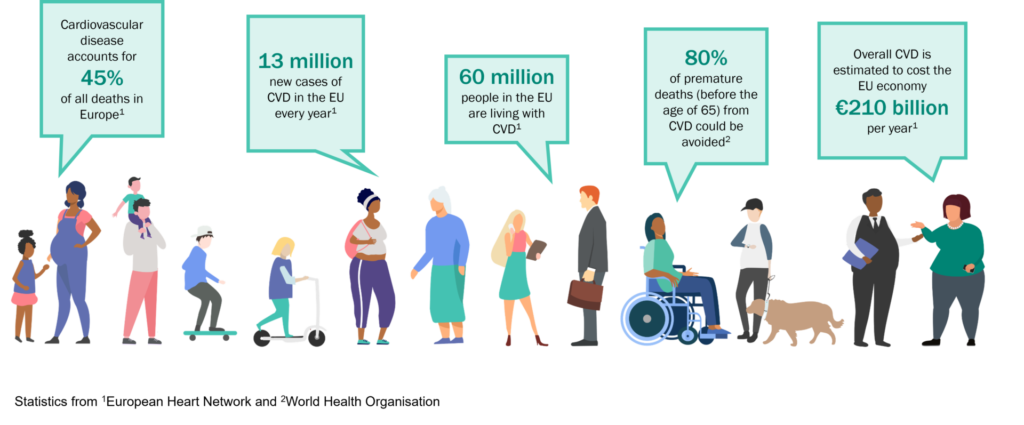The challenges of cardiovascular disease and the unworried unwell
On World Heart Day 2022, the LongITools project hosted its third policy forum “An exposome approach to understanding cardiovascular disease risks across the life-course”. This forum brought together a broad range of stakeholders from clinicians, researchers and policymakers to patient representatives, each offering a different perspective on cardiovascular disease (CVD).
Birgit Beger, (European Heart Network) and Dr David Warriner (Doncaster & Bassetlaw Teaching Hospitals NHS) talked about the challenges of cardiovascular disease from both a European and local level point of view. Our Project Coordinator, Professor Sylvain Sebert explained the project and LongITools researchers Dr Rachel Climie (Inserm and University of Tasmania) and Dr Ana Gonçalves Soares (University of Bristol) and EXPANSE researcher Jeroen de Bont (Karolinska Institute) presented their latest and preliminary exposome research findings relating to cardiovascular disease.
A recording of the event is available here.
The challenges of cardiovascular disease
The prevalence of CVD is increasing and Dr Warriner, a UK consultant cardiologist, observed that CVD patients were attending prematurely and yet late, in other words having accelerated disease (heart attacks) at an earlier age (30-40) and presenting with unrecognised signs and symptoms, days, weeks or even months after onset. It seems that being unwell and unworried is the norm.
There are multiple, cross-cutting CVD risk factors including age, genetic predisposition, social and environmental factors such as air pollution, diet, smoking and physical inactivity, and some of these are modifiable. Healthcare services can treat disease, but they cannot treat societal factors such as poverty, unemployment, living conditions or the economy.

Collective action is needed
According to the European Heart Network, a Brussels-based alliance of foundations and associations dedicated to fighting heart disease and stroke representing patient interests, there are actions that policymakers can take to improve this landscape. Reducing CVD risk (mortality and morbidity) through improved prevention, diagnosis, and earlier access to treatment is crucial. For example, creating healthier living environments by reducing air pollution levels, investing in secondary prevention such as early screening for individuals at high risk, investing in digital and health literacy to enable citizens to navigate information and services, and advancing knowledge in cardiovascular health through research.
LongITools research so far suggests that targeting adverse behaviours, such as poor diet and inactivity, in early life should be a priority if we want to prevent the ensuing tsunami of health and economic burden associated with cardiovascular disease worldwide, as today’s young people age.
An exposome approach
It was also suggested during the forum that interdisciplinary health care models are needed to support patient care. This supports the holistic, exposome approach research of both LongITools, EXPANSE and the other European Human Exposome Network projects. This approach involves studying the impact of many exposures simultaneously, assessing the environmental, socioeconomic, psychosocial, lifestyle and biological factors to which an individual is exposed to throughout their life to better understand the role of such factors in chronic disease.
Moving away from studying ‘one exposure, one disease’ will enable us to provide better evidence to support policymakers develop more appropriate interventions, like those proposed by European Heart Network. However, the evolution of exposome research means that policymakers will also need to work together in a similar, ‘interdisciplinary’ or holistic way. To effectively prevent and treat disease, policymakers from multiple fields will need to develop exposome policies.
Ultimately we need to work collectively and ensure joined up decision making to improve the health of European citizens.
Future LongITools events
The LongITools policy forums are run every six months and the next event will be held on Wednesday 10th May 2023. Please contact us to register your interest for this or future events.